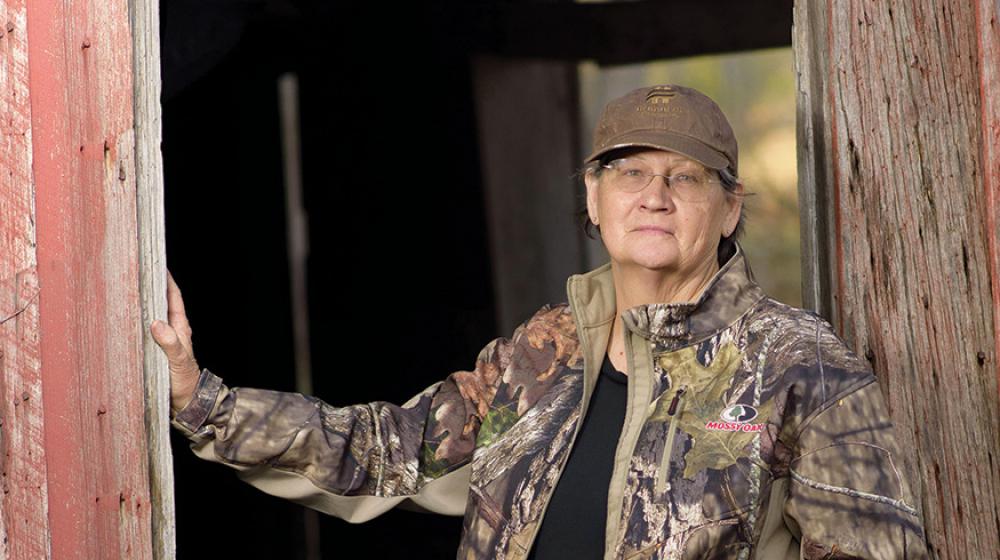In Season

Shirley Skinner, landowner and hunter
Extension helps maintain family's dove habitat
Hunting has been an important part of BJ Skinner’s life since he was a child.
The Neshoba County native grew to love the sport when he and his cousins would pick up the doves that his grandfather and uncle felled in the fields near their Dixon home.
“I’ve been hunting since I was big enough to tote a gun,” BJ laughs. “Before that, my cousins and I would help get the fields ready for doves and plant food plots for the deer and things like that. We thought we were hunting then.”
When BJ and his brother, Shannon, were old enough to hunt themselves, their mom, Shirley, took up dove hunting.
“My husband isn’t much of a hunter, and I didn’t want them going alone. So I started dove hunting because they wanted to go,” she explains.
Most of the Skinner family hunts—doves, rabbits, deer, squirrels, turkeys, ducks.
“Almost anything there is a season for, we hunt,” BJ says. “We’re not trophy hunters by any means. We just enjoy it, even if we don’t bring any game home.”
Dove season is the most anticipated game hunt of the year for the Skinners, as it is for many other hunters in the South. It’s a way for the family to spend time together and pass down traditions and skills to the younger generation.
On opening day in September, several hunters gather in the dove field. Once the harvest is complete, everyone meets back at the house for fellowship and a lunch of grilled, bacon-wrapped dove with all the trimmings, including baked beans and potato salad.
“Last time we had a hunt, I didn’t know how many doves I’d have, but I told them to come on and we’d have what we had,” BJ says. “We ended up with 15 hunters and 60 family members and friends eating, and we had plenty.”
While some doves are inhabitants of Mississippi, others are migratory but will stay in warm areas year-round if the weather is mild and their food needs are met. Proper field management is crucial for hunters and landowners who want to protect the land and encourage the birds to stay around for the three separate dove seasons, from early September to mid-January. The Skinners look to the Mississippi State University Extension Service for advice when planting food plots for the birds and other wildlife species.
“Extension is a very good resource for us,” BJ says. “One year, we had a type of grass that the doves just loved. We didn’t know what it was, so we went to the Extension office and got Harvin (Hudson, Extension agent in Neshoba County) to identify it for us. We wanted to make sure we had that kind of grass every year to help keep the birds coming to our fields.”
The Skinners are avid Extension clients. Shirley has trusted Extension information her entire adult life, and she enrolled her sons in 4-H, the organization’s youth development program, as soon as they expressed an interest in hunting.
“I have always used Extension publications for anything I do, whether it’s growing tomatoes or planting a wildlife food plot,” she says. “As a child, I participated in 4-H, and, as an adult, I was a volunteer. My boys were involved in the wildlife judging program in 4-H.”
BJ’s children are now learning the sport of dove hunting. His two sons, ages 12 and 9, and his daughter, 5, often go to the dove field or shooting house with Shirley.
“When their dad can’t go, I take them and sit with them to make sure they’re safe and following good hunting etiquette,” Shirley says.
BJ fondly recalls the time he spent as a child with his family hunting and making preparations for a favorite family pastime. Extension has been a consistent source of advice about supporting the natural resources on the property to ensure doves and other wildlife return year after year.
“BJ’s family has been very involved with Extension ever since I’ve worked in Neshoba County,” Hudson says. “His mom is a 4-H volunteer, a Master Gardener, a member of the Mississippi Homemaker Volunteers, and she volunteers with check-in of the food preservation exhibits at the Neshoba County Fair every year. BJ has also been involved in all parts of Extension since he was a small child.
We have a great working relationship built on our research-proven advice that helps this family and others ensure the sustainability of their property.”


